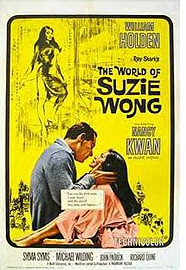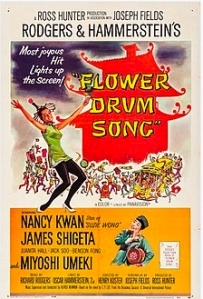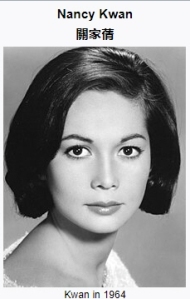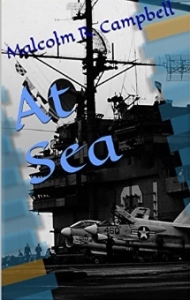In those days we all had a crush on Nancy Kwan
 Even so, years after those days, few people know what to make of the 1960s, the era of flower children, anti-war protests, and distrust of “the establishment.” Nancy Kwan, who appeared in the public eye with the release of “The World of Suzie Wong” in 1960, was a welcome distraction to the forces wreaking havoc on the United States and its institutions.
Even so, years after those days, few people know what to make of the 1960s, the era of flower children, anti-war protests, and distrust of “the establishment.” Nancy Kwan, who appeared in the public eye with the release of “The World of Suzie Wong” in 1960, was a welcome distraction to the forces wreaking havoc on the United States and its institutions.
We were jealous of the William Holden character in the movie and knew that if we knew Suzie Wong–a Hong Kong prostitute–we would propose as Holden’s character Robert Lomax did. Had that happened in “real life,” most of our friends would not have accepted anyone bringing home a Chinese wife any more than the Filipino and Vietnamese wives servicemen brought home with them even though Hollywood was hiring Asian actresses then.
 “Flower Drum Song ” (1961) definitely kept Nancy Kwan on our minds while we were advocating “Make Love Not War.” Wikipedia notes that “”Flower Drum Song became the first major Hollywood feature film to have a majority Asian-American cast in a contemporary Asian-American story. It would be the last film to do so for more than 30 years, until The Joy Luck Club (1993). In 2008, Flower Drum Song was selected for preservation in the United States National Film Registry by the Library of Congress as being “culturally, historically, or aesthetically significant”
“Flower Drum Song ” (1961) definitely kept Nancy Kwan on our minds while we were advocating “Make Love Not War.” Wikipedia notes that “”Flower Drum Song became the first major Hollywood feature film to have a majority Asian-American cast in a contemporary Asian-American story. It would be the last film to do so for more than 30 years, until The Joy Luck Club (1993). In 2008, Flower Drum Song was selected for preservation in the United States National Film Registry by the Library of Congress as being “culturally, historically, or aesthetically significant”
The movie had a great cast though some of us only had eyes for Nancy. When I was in Hong Kong and Kowloon in the late 1960s, a family friend who lived there and spoke fluent Cantonese, gave me a great tour of all the sites and sounds, and even then, I wondered if Nancy Kwan might appear in a Wan Chai District alley and propose marriage. I wouldn’t have said “no” even if I had to take a crash course in Cantonese.
 I’m happy that Nancy Kwan is still around, some years older than me, because her presence on this earth reminds me of Hong Kong, the war, Japan, the draft, and all the other good and bad things of those days when most of us lost our innocence and thought absolution would come through hopes we could never attain.
I’m happy that Nancy Kwan is still around, some years older than me, because her presence on this earth reminds me of Hong Kong, the war, Japan, the draft, and all the other good and bad things of those days when most of us lost our innocence and thought absolution would come through hopes we could never attain.
We saw her in movies and on TV shows into the new century and felt that even though she didn’t know us, she was a friendly face out of the past–and out of our dreams and fantasies as well. She’s still active in the Hollywood world and that’s a good thing for those of us who might still have a crush on her.
 Malcolm R. Campbell’s anti-war novel “At Sea” is available on Kindle.
Malcolm R. Campbell’s anti-war novel “At Sea” is available on Kindle.



